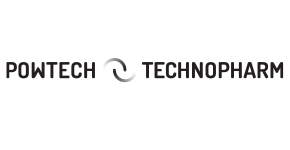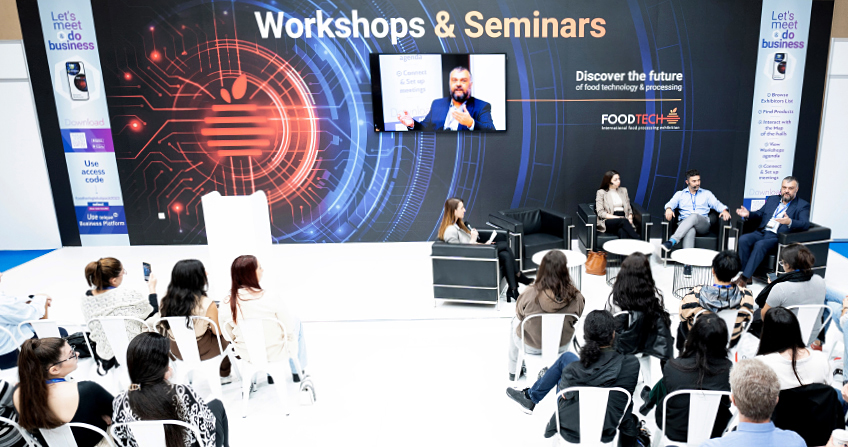
The next day of the F&B Industry
The most current issues that concern the f&b industry was analyzed in depth by industry experts and market executives, at the specially designed FOODTECH Workshops & Seminars stage, during FOODTECH 2023.
Developments in F&B processing dominated the 3rd day
On the third and last day of FOODTECH, the Federation of Hellenic Food Industries (SEVT) took the lead with the first session on “New data on packaging and packaging waste in the Food & Beverage Industry – Developments & Prospects”. The Coordinator of the Conference was Sofia Savvopoulou, Communication Officer of SEVT. The opening of the event was made by Vaso Papadimitriou, General Director of SEVT, who addressed a warm greeting, while making a brief reference to the project and the role of SEVT.
“PPWR: Developments and next steps” was the title of the first speech, with Paschalis Kastanas (Environment & Sustainability Committee SEBT, Sustainability Director NESTLE HELLAS S.A.) analyzing the effects on the Greek Food Industry of the proposals of the ENVI committee (Environment, of Public Health & Food Safety) for the PPWR (EU packaging & Packaging Waste Regulation) regulation which will in fact play a decisive role from 2025 to 2040.
Afterwards, Giorgos Konstantinopoulos (European Commission Conformity Assessment Specialist, Member of Working Groups for Legislation, Air Quality and Industry – European Environmental Bureau, EEB, Head of Legal Affairs Ecocity) spoke about the “Harmonization of European policy and legislation for Packaging and packaging waste – The Importance of the Transition from Directive to Regulation for EU Member States”. Among others, he mentioned the value chains of basic products for packaging, the legislative interventions on it as well as the goals that have been set until 2030.
This was followed by the speech of Dimitris Mantis (President of the Association of Materials and Packaging Industries – SYVIPYS) on “Reengineering Plastic Packaging & Biodegradable Packaging”. More specifically, he analyzed the concept of Recyclass, clarified what is considered recyclable and emphasized that there will be structural changes in the packaging sector. Then Dr. Lefteris Tourasanidis, R&D Manager of the Hatzopoulos company spoke on the topic “Flexible packaging | Design for recycling”, giving various examples and explaining the necessity of the appropriate packaging point.
Afterwards, Dr. Frangoulis D. Krokos (Director / Independent Standardization Unit – ELOT) fully analyzed the topic “Recyclability of packaging – Recyclability specifications & recycling criteria”. In fact, he pointed out the importance of standards and standardization, stating that they provide a presumption of compliance with the European harmonization framework. “Reuse & refill – The cycle of the returnable glass bottle in the soft drink industry – a perennially successful circular economy model” was the title of the speech by Dimitris Gargasoulas, Warehouse Manager, COCA – COLA 3E Hellas ABEE. He started with some general information and features of the glass bottle, while also mentioning the incentive of returning the bottle through the warranty system. Notable is the production of more than 90 million reusable bottles, which go through 8-11 cycles until they reach the end of their life. On the other hand, plastic bottle crates have 18-20 life cycles.
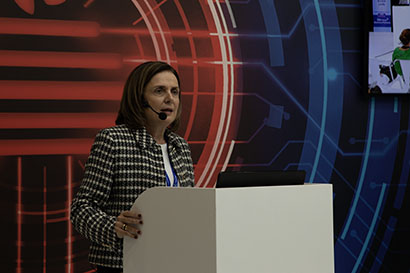
Vaso Papadimitriou
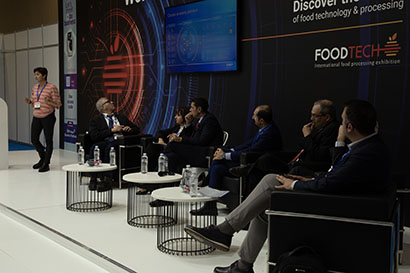
Marianne Richeux, George Konstantinopoulos, Anastasia Arfanakou, Dr. Frangoulis D. Krokos, Dimitris Mantis, Dimitris Gargasoulas
Marianne Richeux, Senior Manager, Sustainability & Government Affairs Europe, CHEP Europe spoke about “CHEP: a 100% Circular business model in action”. The reason for the largest b2b sharing and reuse model at scale in 70 years, pioneering something for the circular economy. He did not fail to mention the sustainability goals of the Brambles roadmap. The first session was closed by Anastasia Arfanakou (Head of the Waste Management Directorate – Ministry of Environment and Energy), who was invited to explain the topic “Limiting excessive packaging and waste prevention – Waste reduction targets for the Member States”. At the top of the hierarchy, he placed the prevention of waste generation, while the reference to the main axes was not missing. Then he proceeded to Article 9 and more specifically to the minimization of packaging, emphasizing the need for the least possible weight of the packaging, while maintaining its functionality. Finally, he referred to the obligations related to excessive packaging and restrictions on the use of certain forms of packaging.
The second session on “Funjuice – Modern food trends & new food products” was characterized by a series of very interesting speeches. The beginning was made by Katia Vartaliti (Coordinator of the SEVT Nutrition Policy Committee, Director of Food Legislation & Scientific Affairs / NESTLE HELLAS SA), who was positioned around the Food Industry’s Initiatives for Healthy Nutrition. After presenting the Greek Food and Beverage Industry in numbers, he moved on to the association’s role and mission, as well as the challenges and priorities it faces. He also did not hesitate to emphasize the importance of the phrase “From Farm to Plate”.
A research on modern consumer trends was presented by Lefteris Kioses (Director General of IELKA). He emphasized that environmental disasters affect not only the behavior but also the lives of the consumer public, pointing out that they have been forced to face a series of crises in recent years. The three most important problems that the public has to face are the pandemic, the war in Ukraine and the economic crisis with an emphasis on the severe food price hikes.
Using many examples, Katerina Papakonstantinou (Nutrition Policy Committee CEBT – Corporate & Government Affairs Manager Mondelēz Greece) analyzed Mindful Snacking. In a few words, she explained that it is a set of behaviors so that one can enjoy his snack with care. It fits easily into anyone’s daily life, it has a flexible shape, it has no age and time limitations. At the same time, she also mentioned the consolidation of the so-called snacking report.
The second session was closed by Irini Zouganeli (Innovation Scouting & Insights Manager of Marketing & Innovation Division DELTA TROFIMA SA), who was placed around Functional Foods. She mentioned the six main axes that a healthy diet targets which have to do with the immune system, gut health, cardiovascular issues, the mind, sleep and boosting energy. In fact, she pointed out that 6/10 people try to follow a healthy diet, while 1/3 consciously choose foods that are good for their health.
The third session may have been about Funjuice again, but this time the talks revolved around natural fruit juices enriched with probiotic bacteria and other biofunctional ingredients in an encapsulated form. Kostas Koutsoumanis, professor of AUTH proceeded with an interesting presentation of the Funjuice project, analyzing both its goals and challenges as well as the methodology. Subsequently, the baton was taken via Zoom by the associate professor of the AUTH, Thomas Moshakis, who was positioned around the “Development and characterization of structured encapsulation systems for the integration and protection of probiotic and biofunctional components in natural fruit juices”. He started with the definition and beneficial health benefits of probiotics and then discussed the concept of microencapsulation, complex aggregation and fibrinotropic gelling.
Dr. Anthoula Argyri (ELGO-DIMITRA) analyzed the applications of probiotic microorganisms in food. She mentioned some sources of isolation of microorganisms such as people and fermented foods as well as the conditions for characterizing a microorganism as a probiotic. Finally, she did not hesitate to emphasize that food is the best source of probiotics. Dr. Natasa Kapetanakou (Head of SEBT programs) presented the research on acceptance & commercial exploitation of natural juices enriched with probiotic bacteria and other biofunctional ingredients. Three main stages were needed to conduct the research: The development of questionnaires, the dissemination of questionnaires and the collection and processing of data. This was followed by some general statistics as well as the assessment of intention to consume and purchase Funjuice juices.
Last but not least, the SEVT Conference closed with Emilia Papakonstantinou (Assistant Professor, GPA), who spoke via zoom, about the effect of consuming natural fruit juices enriched with probiotic bacteria and other biofunctional ingredients on health indicators.
Food safety & modern technological developments in olive oil on day 2
The second day of FOODTECH Workshops & Seminars started with the corporate presentation of BIOMERIEUX HELLAS on the topic “The future in Food Quality Control”. Mr. Vasilios Arvanitidis (Food Market & Product Manager – Adriatic Cluster bioMérieux S.A) analyzed the holistic approach of bioMérieux in the service of Food Quality, presenting an ecosystem of advanced diagnostic technologies, while Ms. Evelina Moschou (Industry Account Manager – bioMérieux Hellas S.A.), underlined the importance of data, but also the motivations that lead to digitization, approaching food safety in a new way. Then Mr. Suzuki Kenji (Global Market/Segment Manager Global Marketing Food – bioMérieux S.A.) spoke, who presented for the first time in Greece the VIDAS Kube, the new automated food pathogen detection solution.
Then, on the stage of the FOODTECH Workshops & Seminars, the Olive Tech Lab took place on the topic of “Olive oil: The modern technological developments in a Traditional product”. Two panels, which were moderated by Mr. Giorgos Oikonomou (Business Consultant), focused on the “liquid gold” of our country, as it was described. In the context of the first discussion, Mr. Evangelos Aspiotis (Partner at OLIOTECH P.C. and Managing Director at ENERPIQ CONSULTING P.C.), focused on the new methods of optimizing olive oil production, emphasizing that there are now “smart” technologies on which the oil producer must adopt in order to be more efficient. Then, Mr. Nikolaos Thomaidis (Professor of Analytical Chemistry EKPA, Co-Founder & CTO Track4Value) spoke about the superiority of the quality characteristics of olive oil, but also its contribution to longevity and health, noting, among other things, that the research carried out and the study of all these special features gives added value to the product. Next speaker, Mr. Angelos Mochloulis (Engineer with many years 3of experience as CEO in food technology multinationals), analyzed how much technology helps in the production of a high-quality final product of olive oil, pointing out that machines can produce high-quality olive oil, however, the difference is made by each user, depending on how educated/informed they are, but also in what way they use the available technology. Afterwards, Mr. Polydevkis Hatzopoulos (Professor of Molecular Biology, Agricultural University of Athens), made a very interesting speech about the olive and the environment.
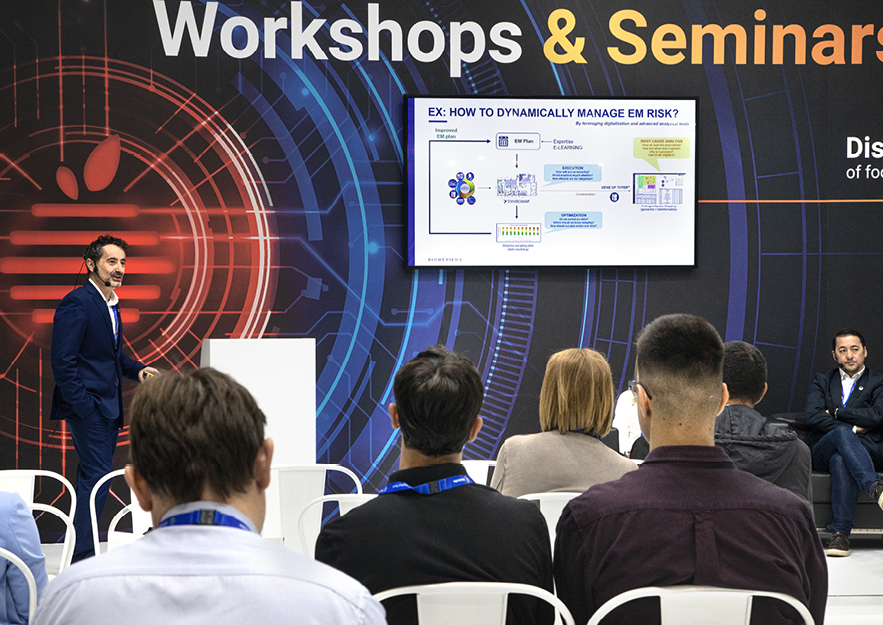
Vasilios Arvanitidis
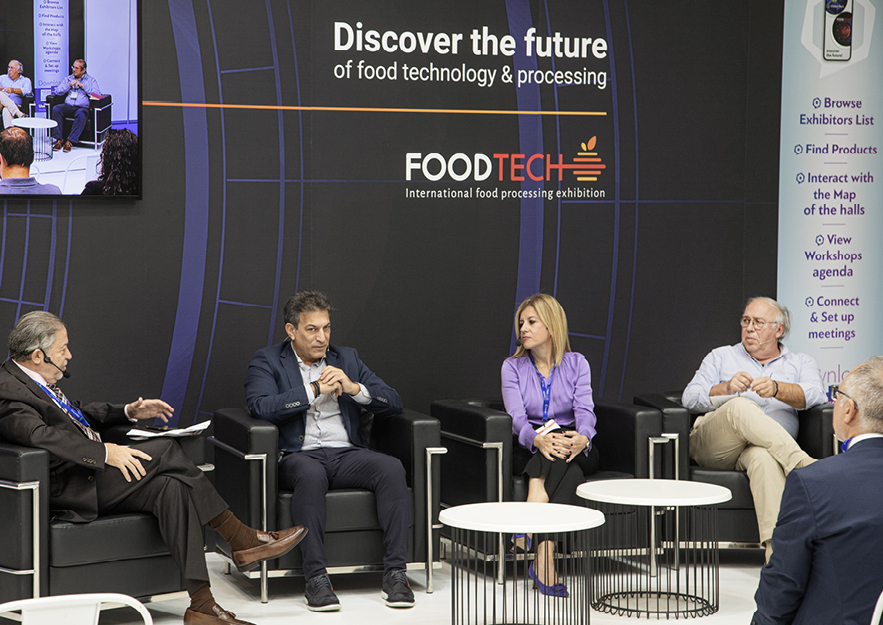
George Economou, Thanos Angelakis, Veni Giza, Nikos Kasalias, Panagiotis Skandamis
The second panel approached olive oil from a different point of view, emphasizing exports, gastronomy, but also packaging. Mr. Dimitris Anastopoulos, (Advisor of businesses in the agri-food sector and Entrepreneur) referred to the exports of standardized olive oil, explaining whether it is an opportunity or a trap. Then, Mr. Dimitris Karavasilis (CEO DK CONSULTANTS GROUP, Expert and Specialist in International Trade), spoke about the future of packaging in international trade, what is the need of the consumer in the international market, but also about the how Greek olive oil is treated. Next, Mr. Giorgos Kavvathas, (President of GSEVEE & POESE), took the floor, analyzing the importance of olives and olive oil in mass catering. At the same time, he emphasized that the sector must realize that it has “Greek gold” in its hands, while he proposed the creation of an e-shop inside the restaurants, where the raw materials used for the preparation of the dishes will be sold packaged, underlining at the same time the importance of the company showing the consumer that the olive oil must be packaged. The discussion concluded with Mr. Nikos Fotiadis (Executive chef, President of Chefs Brigade Greece Slow food community), who mentioned the importance of olive oil as a key ingredient of Greek cuisine and emphasized the need to redefine the training of cooks, waiters and restaurateurs in this area of olive oil.
The program of the FOODTECH Workshops & Seminars was completed with the Meat Tech Lab, where two more panels were held, which focused on the “New era in the field of Meat and meat products”, while the moderator was Mr. Economou. The first panel began with the presentation of Mr. Thanos Angelakis (President of the National Interprofessional Organization Poultry), who spoke about the prospects of the poultry sector, noting that the Greek businesses in the chicken sector are vertically integrated, organized units, which are constantly and rapidly evolving. «As an industry, we managed to “build” a consciousness of Greekness and locality in the Greek consumer, who appreciated and realized how high quality Greek meat is», he said, among other things.
Then, when asked about the “hot” issue of salmonella, he responded, separating the myths from the truths. The next speaker was Mrs. Veni Giza (President of IPC), who spoke on the issue of defending the term “meat”, arguing that specific terms should not be used in non-animal products, as this may mislead the consumer but also create unfair competition. Afterwards, Mr. Nikos Kasalias (Veterinarian, food microbiologist), referred to the connection between the primary sector and the Greek meat industry, analyzing, at the same time, the opportunities, threats and related challenges. Immediately after, Mr. Panagiotis Skandamis (Professor of the Agricultural University of Athens) spoke about the modern tools that have been developed in the service of meat hygiene and safety, making special reference to the analysis of risk, but also of sustainability.
Later, at the Meat Tech Lab, Ms. Anastasia Kritikou (Chemist, Postdoctoral Researcher EKPA, Co-Founder of Track4Value) spoke about the challenges in the meat sector, presenting innovative tools for highlighting the identity of Greek production systems and for documenting the quality, safety and authenticity of the product. Afterwards, Mr. Panagiotis Katikos (Veterinarian, technical advisor of POKK-Panhellenic Federation of Butchers) made a speech about the current legislation in the meat sector, also answering the question of which issues are pending and need to be regulated. Then, Mr. Stelios Skaribas (SEVEK President), mentioned the prospects of exporting meat preparations, but also the problems that arise, stressing that Greek production must be supported not only in the centers, but also in the periphery. The “curtain” was thrown by Mr. Nikolaos Solomakos (Deputy Professor of Hygienic Foods of Animal Origin at the University of Thessaly), who explained the effect climate change has on meat safety.
Food safety at the center of the speeches on the 1st day
FOODTECH Workshops & Seminars started today with the Workshop of the Panhellenic Union of Food Technologists, titled “Safety culture and innovation, as components in the modern industrial production-packaging of food and non-food”. The first panel, moderated by Ms. Evi Constantini (Biotechnologist MSc, PETET member) focused on the issue: Nutrition myths, acrobats in safety and innovation”.
First, Mr. Ioannis Smarnakis (President of PETET, Director of Factory & Development of Lavdas S.A.) referred to sugary products and those with sugar substitutes, but also to the importance of a balanced diet, while underlining that what one consumes it is a matter of choice that must be based on reliable information.
Afterwards, Ms. Olga Malisova (Assistant Professor, Department of Food Science and Technology, University of Patras) referred to the innovative categories of sugar substitutes. She argued that it is all about the amount one consumes regardless of choice and noted that the consumer should be properly informed and always read the label. Mr. Nikolaos Gionis (Food Technologist MSc, chief inspector of TUV Austria Hellas) spoke about the difficulty of replacing salt by the industry. He also referred to the results of a recent survey that highlighted the reduction of trans fats in standard foods (from 2015 to 2021) and the simultaneous increase of saturated fats, and in turn concluded that it is the consumer’s responsibility to be informed, but also to change – when necessary – fixed perceptions about what to choose (based for example on the appearance of the food and not on its quality characteristics).
Mr. Ilias Alexiou (Vice-President of PETET, inspector of the Attica region) referred to the nutriscore food grading system, which (based solely on the recording of fat) unfairly treats foods such as olive oil, feta cheese and olive oil, but also on the consumer’s responsibility to conscious choices, based on his personal nutritional needs and the corresponding nutritional declaration of each product as shown on its label (calories, trans fat, sugar, salt).
Finally, Mr. Smarnakis noted that a company can use legislation to innovate. It is enough that they know the legislation well and respond to consumer needs (eg gluten-free products, etc.). He also noted that the industry must invest in sustainable development. “Everything we do as consumers and scientists must have this perspective”, noted Mr. Smarnakis.
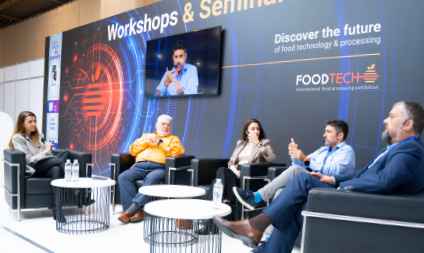
Evi Constantini, Ilias Alexiou, Olga Malisova, Nikolaos Gionis, Ιoannis Smarnakis

Panagiotis Maniateas, Panagiotis Skandamis, Mousia Zoi, Nikos Gdontelis, Andriana Lazou
The second panel moderated by Ms. Athanasia Antoniou (Agronomist – Food Technologist, Special Secretary of PETET) titled “Safety and innovation in food packaging” began with the presentation of Ms. Fani Tsironi (Assistant Professor, Department of Food Science and Human Nutrition), G.P.A.), regarding new friendly packaging (such as biopolymers), but also the goal of reducing the use of plastic in food packaging and limiting packaging waste, which are European commitments.
Then Mr. Nikolaos Andritsos (Assistant Professor, Department of Food Science and Technology, University of Patras) referred to the life expectancy of packaged products and the differences between the “best before” marking and the expiration date, while he spoke about modern innovations in packaging food mainly in terms of their safety (like nanosensors that detect toxins, chemicals, etc.).
Then Mr. Costas Samios (PhD, Director of Quality Assurance TSIMIS S.A.), spoke about the dominant trend in the food packaging market today, which is none other than Recycling and consequently the use of new materials, which are changing necessarily not only the flexible packaging but also the life expectancy of the products.
Afterwards, Ms. Eleni Gogou (Dr. Chemical Engineer, Researcher, Chemical and Food Engineering NTUA) referred to the innovations of smart packaging and the way in which it could serve the entire supply chain. Finally, she noted the contribution that food packaging could have in reducing food waste, which is also a European goal for all member states.
The third panel of the PETET seminar on “Safety and innovation in food production”, moderated by Mr. Panagiotis Maniateas (Food Technologist, G.G. PETET), began with the introduction of Ms. Andriana Lazou (Assistant Professor, Department of Science and of Food Technology, PA.DA), which referred to the development of products in production, underlining that the consumer is the one who moves the strings and indicates to the Food Industry what to do, according to their needs and desires.
Then, Mr. Nikos Gdonelis (Biology MSc, General Director CIBUM) spoke about the food safety culture, which all businesses must have, noting that in Greece we have very remarkable food technologists with very capable safety systems, however, they do not often extend across the entire scope of the enterprise. Finally, he explained how a good food defense plan can help a company at every level.
Afterwards, Mr. Panagiotis Skandamis (Professor, Department of Food Science and Human Nutrition, G.P.A), referred to the modern tools that we observe at an international level around food safety and more specifically to the transition from the haccp standard to a more probabilistic assessment of food safety (risk). He emphasized that the industry has made an excellent progress in terms of safety and spoke of smart traceability and food safety culture.
Finally, Ms. Zoe Mousia (Dr. Chemical Engineer) answering to the question of whether safety and innovation are equally important factors in food production, she underlined the importance of safety, considering it non-negotiable. She also praised the European food system as one of the safest in the world and referred to the modern challenges and the role of the authorities whose primary objective is to protect the consumer.



